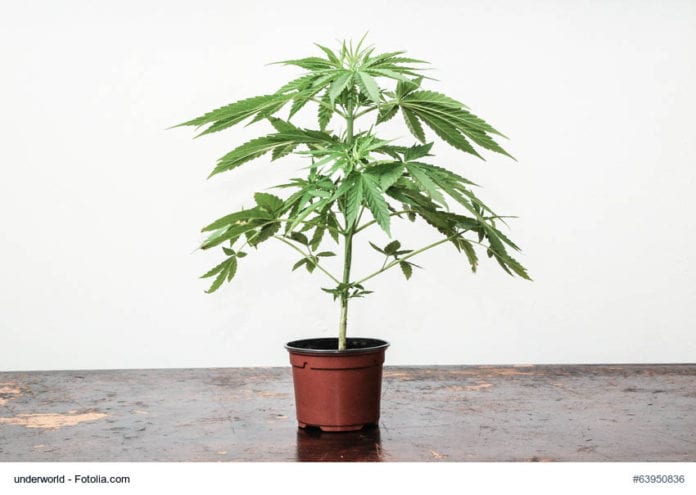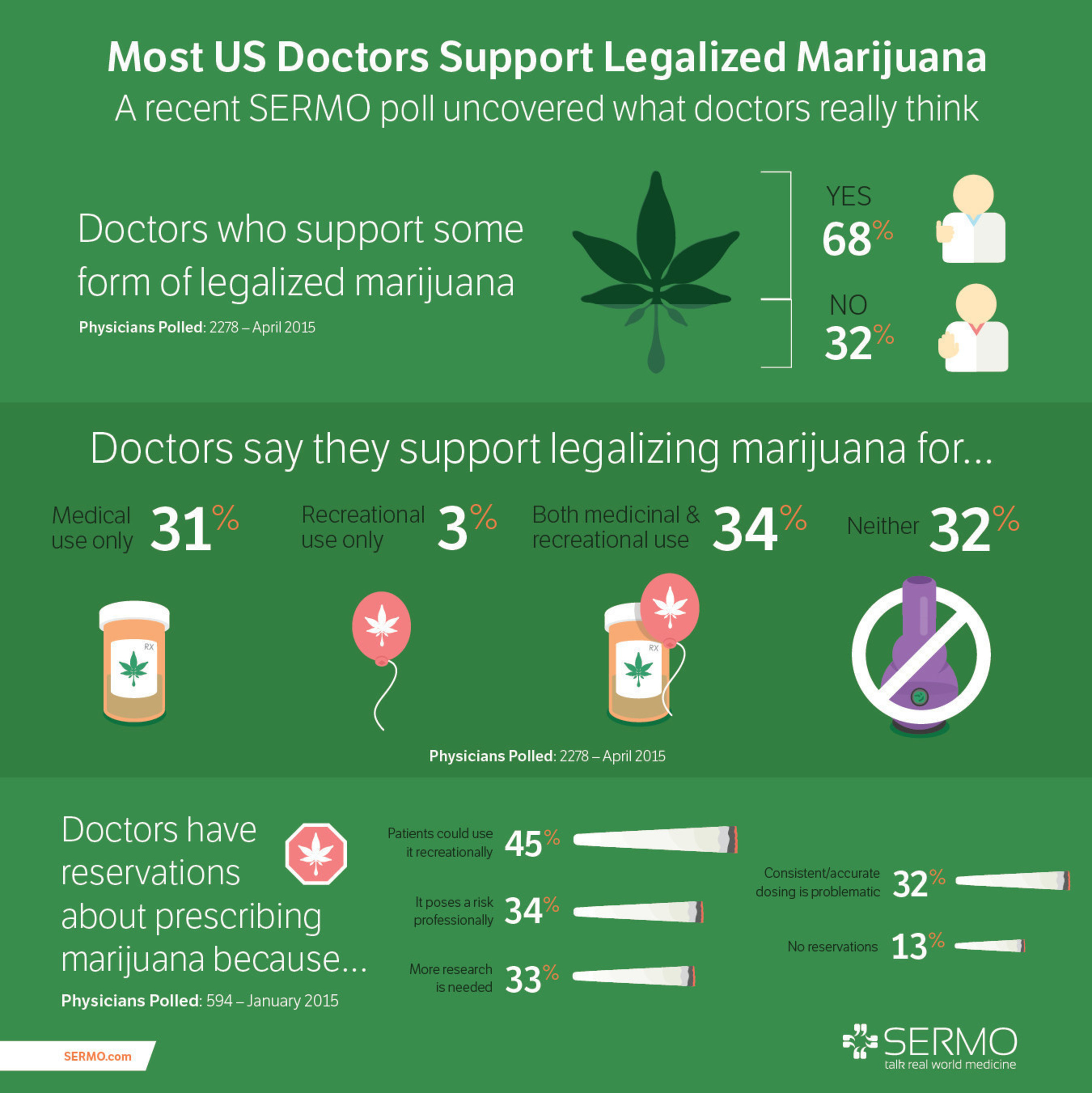68 percent of US physicians support legalized cannabis says a recent poll by SERMO, the top social network exclusively for doctors. SERMO polled 2,278 doctors and found that 68 percent of physicians support some form of legalized cannabis. Out of the 68 percent of doctors who support cannabis legalization:
- 34 percent support legalization for both medical and recreational purposes
- 31 percent support legalization for medical purposes only
- 3 percent support legalization for recreational purposes only
One SERMO oncologist gave his verdict on marijuana: "This drug is far less dangerous to one's health than another drug that is already legal: alcohol."
Why do 68 percent of doctors support legalized cannabis?
The poll sparked a heated debate within SERMO, a virtual doctors' lounge that provides a safe online space for doctors to discuss all aspects of medicine candidly. Doctors who are able to prescribe medical marijuana legally spoke of their experiences:
"I have seen firsthand [marijuana-derived] cannabidiol (CBD) extract given to patients for seizures, muscle spasms, and bladder [issues] seen in many MS patients…in the majority of the cases it works very well, alleviating or greatly reducing the aforementioned symptoms."
Some patients with psychiatric issues may also benefit from medical marijuana, as a Colorado-based psychiatrist reported:
"I have seen a few PTSD patients who have diligently sought out specific cannabis strains and do extremely well on proper medical marijuana edibles."
A general practitioner spoke from personal experience:
"I have cancer and am in the midst of chemotherapy. My oncologist added [a synthetic version of THC (the principal psychoactive agent of cannabis)] and my nausea is mostly gone; I still feel like crap for a week after each chemo treatment, but it's much better than feeling like nauseated crap."
Doctors also felt that legalization would mean a taxed, regulated, and therefore safer product, referring to the current quality and safety of 'street marijuana' as a "crapshoot."
But while many doctors believe that the medical potential of cannabis "largely remains untapped," not everyone was eager to prescribe marijuana, which some considered akin to "dumping 480 different chemicals into a body without having any idea what the interactions are."
32 percent of doctors think cannabis should remain illegal
Some doctors were willing to admit that a lack of clinical knowledge contributes to their reservations regarding legal cannabis. One oncologist confessed:
"I'm scared of pot just because it's always been illegal and I don't know anything about it. I wouldn't go on the record recommending [cannabis] outside of treatment for cancer symptoms."
But with cannabis classed as a Schedule I drug, opportunities for further scientific research are severely curtailed by government regulations. As one pediatrician said:
"At the present state of research, it is undesirable for doctors to "prescribe" [cannabis]. At the same time, the current status of the plant as Schedule I is quite absurd and…impedes unbiased scientific inquiry. No other drug on the planet is treated in this manner."
Medical cannabis can make doctors the 'gatekeepers' to patient's drug of choice
Doctors who support legalization for recreational purposes are concerned that limiting legalization to only medical cannabis would make physicians the "gatekeepers to patients' drug of choice."
Many physicians emphasized that they didn't care what their patients did to relax, be it cannabis or alcohol, as long the use was both responsible and in moderation. One general practitioner took a more practical and political stance in his support for legalized cannabis:
"I don't like weed personally. I have no plans to use it myself, [and I] don't want my kids to use it, but the incredible waste of time, money, and effort that have gone into maintaining the illegality of this substance is monumentally stupid."
Doctors' reservations regarding prescribing medical cannabis
When SERMO asked 594 doctors about their reservations prescribing cannabis in a separate poll in January of this year:
- 45 percent were concerned medical marijuana would be used recreationally
- 34 percent were concerned it would pose a risk to their profession
- 33 percent said they needed to see more clinical studies
- 31 percent were concerned about consistent, predictable, and accurate dosages
- 13 percent had no reservations
With ever-increasing demands on their time, doctors have concerns that legalizing marijuana for only medical purposes will become a burden, as one psychiatrist put it:
"There seems to be a role for cannabis in medicine, but I do not want to deal with being Dr. Pot. I am busy enough."
Opinions have evolved: doctors are now more liberal when it comes to cannabis
These recent poll results showed a marked difference in physician sentiment when compared to a 2012 SERMO poll where 61 percent of physicians (N=593) said they would not prescribe marijuana for medicinal purposes if and when it were legalized in their state.
In the word of one SERMO pathologist:
"Cannabis is by no means a cure all, but to dismiss it out of hand as some of you have, is reprehensible and not keeping with responsible science."
A note on the data
SERMO members must go through a three-stage, highly secure, and accurate verification process. While the data have not been weighted to reflect the demographic composition of US physicians, SERMO physicians index closely to the demographics of American physicians in general, as benchmarked by the AMA. Because the sample is based on those who initially self-select for participation rather than being targeted from a probability sample, no estimates of sampling error can be calculated when projecting to the universe of US Physicians. However, the margin of error when projecting the most recent poll (of 2,278 doctors) to active SERMO members is ±2 percent. The margin of error when projecting the previous polls from January 2015 and November 2012 (of 594 and 593 doctors respectively) is ±4 percent. It is calculated at the standard 95 percent confidence level. Therefore we can be 95 percent confident that the sample result reflects the active SERMO member base within the margin of error. This calculator is based on a 50 percent result in a poll, which is where the margin of error is at its maximum. All sample surveys and polls may be subject to multiple sources of error, including, but not limited to sampling error, coverage error, and measurement error.



